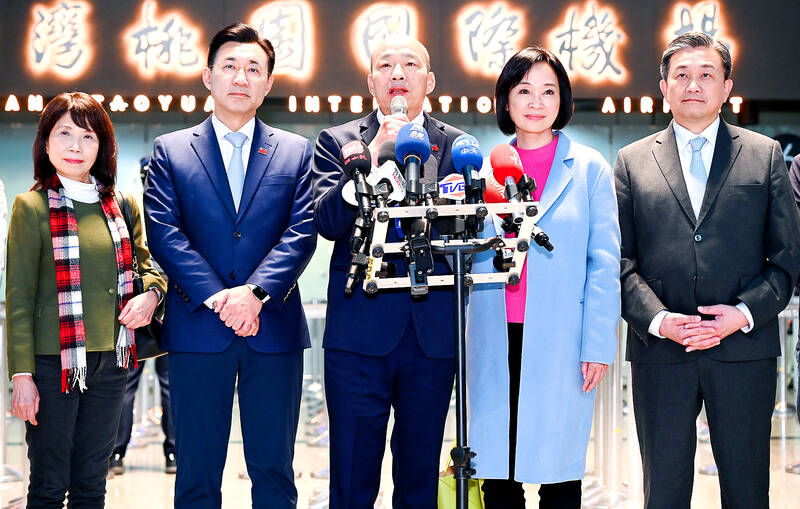A delegation of cross-party lawmakers from Taiwan, led by Legislative Speaker Han Kuo-yu (韓國瑜), for the inauguration of US president-elect Donald Trump, would not be able to attend the ceremony, as it is being moved indoors due to forecasts of intense cold weather in Washington tomorrow.
The inauguration ceremony for Trump and US vice president-elect JD Vance is to be held inside the Capitol Rotunda, which has a capacity of about 2,000 people.
A person familiar with the issue yesterday said although the outdoor inauguration ceremony has been relocated, Taiwan’s legislative delegation has decided to head off to Washington as scheduled.

Photo: Chu Pei-hsiung, Taipei Times
The delegation would also conduct parliamentary diplomacy by visiting overseas Taiwanese and members of the US Congress, and they hope their visit can deepen the Taiwan-US relationship, reaching a new milestone, they said.
The US Joint Congressional Committee on Inaugural Ceremonies (JCCIC) plans to move tomorrow’s inauguration ceremony indoors, just as former US president Ronald Reagan’s second inauguration in 1985 was also forced to relocate to the Capitol Rotunda due to cold weather, the person said.
Live viewing of the inaugural ceremony would be moved to Capital One Arena.
With the ceremony shifted indoors, most of the ticketed guests, and many domestic and foreign dignitaries would no longer be able to attend it in person, they added.
The Taipei Economic and Cultural Representative Office in the US is doing its best to handle the situation, as it on Friday morning had just reported to media about its arrangements for the delegation and suddenly learned about the JCCIC’s decision to cancel the outdoor ceremony, they said.
The decision to move the ceremony indoors is to prevent tens of thousands of dignitaries, law enforcement officers, paramedics and members of the public from getting cold injuries, they said, adding that it is rare for Washington to have extreme cold weather, but hopefully everyone can stay warm and safe.
Meanwhile, Han yesterday at Taiwan Taoyuan International Airport said many foreign leaders were also on their way even with the threat of heavy snow, and that he was going there to extend Taiwan’s “highest blessings” to the US.
“All of our delegation members likewise are taking this enthusiasm to the US to represent [our] 23 million people, and we extend our highest blessings to the US presidential team and to the people of the US,” he said.
Taiwan enjoyed strong support from the first Trump administration, including regularizing arms sales which have continued under US President Joe Biden. However, Trump unnerved Taiwan on the campaign trail by calling for it to have to pay to be defended.
The US, like most countries, has no formal diplomatic ties with Taiwan, but is bound by law to provide the nation with the means to defend itself.
During a meeting in Taipei on Friday with Mike Pence, former vice president in Trump’s first administration, President William Lai (賴清德) said that given China’s threats against Taiwan and Beijing’s cozying up to countries such as Russia, democracies needed to work together.
“I believe that when the partnership between Taiwan and the US becomes stronger, the power to maintain peace and stability in the world will also become stronger,” Lai told Pence.
Additional reporting by Reuters

Palauan President Surangel Whipps Jr arrived in Taiwan last night to kick off his first visit to the country since beginning his second term earlier this year. After arriving at Taoyuan International Airport at around 6:30 pm, Whipps and his delegation were welcomed by Minister of Foreign Affairs Lin Chia-lung (林佳龍). Speaking to gathered media, the Palauan leader said he was excited and honored to be back in Taiwan on his first state visit to Taiwan since he was sworn in this January. Among those traveling with Whipps is Minister of State Gustav N. Aitaro, Public Infrastructure

RESOLUTIONS DEBATE: Taiwan’s allies said that UN and WHA resolutions cited by China and other nations ‘do not determine Taiwan’s participation in WHO activities’ A proposal to invite Taiwan to this year’s World Health Assembly (WHA) was rejected on Monday, resulting in Taipei’s absence from the annual meeting for a ninth consecutive year, although partners spoke up for Taiwan’s participation at the first day of the meeting. The first agenda item after the opening was a “two-on-two debate” on a proposal to invite Taiwan to participate at the WHA as an observer. Similar to previous years, two countries made statements in favor of the proposal, while two others expressed their opposition. Philippine Secretary of Health Teodoro Herbosa, president of the 78th WHA, accepted the WHA General Committee’s

Premier Cho Jung-tai (卓榮泰) on Friday laid out the Cabinet’s updated policy agenda and recapped the government’s achievements ahead of the one-year anniversary of President William Lai’s (賴清德) inauguration. Cho said the government had made progress across a range of areas, including rebuilding Hualien, cracking down on fraud, improving pedestrian safety and promoting economic growth. “I hope the public will not have the impression that the Cabinet only asked the legislature to reconsider a bunch of legal amendments,” Cho said, calling the moves “necessary” to protect constitutional governance and the public’s interest. The Cabinet would work toward achieving its “1+7” plan, he said. The

Nvidia founder and CEO Jensen Huang (黃仁勳) hosted a dinner in Taipei last night with key Taiwanese suppliers to celebrate the successful mass production of the company’s new Blackwell AI systems. Speaking to the media earlier yesterday, Huang thanked Nvidia’s Taiwanese partners for their contributions to the company’s ecosystem, while also sharing his plans to meet with Taiwan Semiconductor Manufacturing Co (TSMC) founder Morris Chang (張忠謀). In response to rumors that Nvidia will launch a downgraded Hopper H20 chip for China in July, Huang dismissed the reports, saying, “That is not true.” He clarified that there